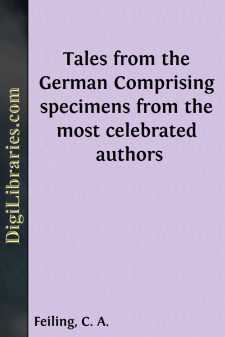Categories
- Antiques & Collectibles 13
- Architecture 36
- Art 48
- Bibles 22
- Biography & Autobiography 813
- Body, Mind & Spirit 142
- Business & Economics 28
- Children's Books 15
- Children's Fiction 12
- Computers 4
- Cooking 94
- Crafts & Hobbies 4
- Drama 346
- Education 46
- Family & Relationships 57
- Fiction 11829
- Games 19
- Gardening 17
- Health & Fitness 34
- History 1377
- House & Home 1
- Humor 147
- Juvenile Fiction 1873
- Juvenile Nonfiction 202
- Language Arts & Disciplines 88
- Law 16
- Literary Collections 686
- Literary Criticism 179
- Mathematics 13
- Medical 41
- Music 40
- Nature 179
- Non-Classifiable 1768
- Performing Arts 7
- Periodicals 1453
- Philosophy 64
- Photography 2
- Poetry 896
- Political Science 203
- Psychology 42
- Reference 154
- Religion 513
- Science 126
- Self-Help 84
- Social Science 81
- Sports & Recreation 34
- Study Aids 3
- Technology & Engineering 59
- Transportation 23
- Travel 463
- True Crime 29
Tales from the German Comprising specimens from the most celebrated authors
by: C. A. Feiling
Description:
Excerpt
INTRODUCTION.
The object of the translators of the following tales was to present the English public with a collection, which should combine effectiveness with variety, and at the same time should contain specimens of the most celebrated writers of prose fiction whom Germany has produced. The names of the authors will, they think, be a sufficient guarantee that they have not failed in this last respect, and if the reader finds himself amused or interested by the series, they will have succeeded entirely.
It will be remembered that the collection is a collection of tales only, and that it was absolutely necessary, according to the plan of the book, that these tales should be numerous. Any thing like a lengthened novel was therefore excluded, as it would have exceeded the prescribed limits, or rendered impossible that variety which the translators considered an essential of their work. That short tales, from their very nature, cannot often promote any very high purpose, and that amusement for a leisure hour is their principal purpose, the translators are perfectly aware, admitting that their collection, generally speaking, does not convey that amount of instruction in life and thought, which might be obtained from more elaborate works, such as, for example, the Wilhelm Meister of Göthe. At the same time they trust that Kleist's Michael Koldhaas, Zschokke's Alamontade, Schiller's Criminal from Lost Honour[] and even Hauff's fanciful Cold Heart, will be acceptable to those who look for something beyond mere amusement, and that some readers will be found to appreciate the psychological truth and profundity of Hoffmann's tales beneath their fantastic exterior.
In their versions of the tales the translators have endeavoured, to the utmost of their power, to be correct, preferring even hardness of language to liberties with the original text. The initials in the table of contents will show who was the translator of each particular tale; but it must not be supposed that they worked so separately that the printer and the binder have alone connected the results of their labours. Every tale when finished by the translator was carefully revised by his colleague. In those instances alone have the translators deviated from the original, where they found passages and phrases that they conceived would not accord with English notions of propriety. That in such instances they have softened or omitted, needs no apology.[]
It has been suggested to the translators that a notice of the authors and the works themselves might, with advantage, be prefixed to the collection. With this suggestion they have complied, trusting that the limited space allowed will be a sufficient excuse for the very sketchy nature of the biographies, if indeed the following notices are worthy of that name.
Göthe and Schiller have attained that universal celebrity, that it would be mere impertinence to say any thing about their lives in a sketch like this. Those eminent promoters of German literature in this country, Mr....


